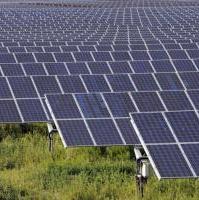
Fueling Jobs in Renewable Energy
U.S. Energy Secretary Dr. Steven Chu cited progress on solar, wind, and EV battery initiatives in a Feb. 1 letter saying he’ll soon return to California and to academia.
- By Jerry Laws
- Feb 12, 2013
New initiatives, green jobs, and climate change are highlighted in the Feb. 1 letter U.S. Energy Secretary Dr. Steven Chu sent to DOE employees announcing he will soon leave the department to return to California and to the academic world of teaching and research. Chu cited the $36 billion in Recovery Act funding DOE was allocated to help ensure that clean energy jobs of tomorrow are created here in the United States. He pointed out some of the department's initiatives that are reducing the cost of renewable energy production and creating new jobs in this field.
The SunShot Challenge calls on industry to reduce the full cost of utility-scale solar energy to $1 per watt, which Chu said is close to the projected U.S. Energy Information Association cost of natural gas. "When we first discussed this goal, industry did not take it seriously," he wrote. "Today, they tell me that our input challenged them to rethink their road maps and now agree that it is an achievable goal."
Having plug-in hybrids or EVs with a 100-mile range at the same cost of owning and operating a comparably sized internal combustion engine is the goal of the EV Everywhere Challenge, also cited in Chu's letter, which predicts the batteries developed for plug-in EVs "will also revolutionize the electrical distribution system and the use of renewable energy."
He noted wind energy is expected to reach grid parity in less than a decade and that the American Wind Energy Association has reported that last year, 42 percent of new energy capacity in the United States was from wind -- more than any other energy source. "Unless we develop new business models with utility companies and other stakeholders, we will not be able to take full advantage of the accelerating pace of technology," he warned.
With so many fast-moving energy initiatives already in the pipeline, a master's degree in Energy Law & Regulation may be the ticket before the end of this decade.
On climate change, Chu's letter echoed President Obama's words during his second inaugural address. Chu wrote, "The average temperature of our planet is rising, with majority of the temperature increase occurring in the last thirty years. During the three decades from 1980 to 2011, the number of violent storms, floods, droughts, heat waves, wildfires, as tabulated by the reinsurance company Munich Re, has increased more than three-fold. They also estimate that the financial losses follow a trend line that has gone from $40 billion to $170 billion dollars per year. Most of those losses were not insured, and the country suffering the largest losses by far is the United State. The overwhelming scientific consensus is that human activity has had a significant and likely dominant role in climate change. There is also increasingly compelling evidence that the weather changes we have witnessed during this thirty year time period are due to climate change.... While we cannot accurately predict the course of climate change in the coming decades, the risks we run if we don't change our course are enormous."
About the Author
Jerry Laws is Editorial Director of www.eponline.com, a website maintained by 1105 Media Inc.